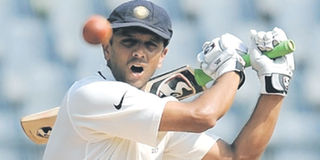Like Dravid, Kenyan players should let bat do the talking

Indian batsman Rahul Dravid plays a shot during the fifth day play of the third Test cricket match against the West Indies at The Wankhede Stadium in Mumbai on November 26 last year. The veteran cricketer announced his retirement from international cricket on Friday after a distinguished 16-year career. Photo/AFP
After a wonderful run in the Test series, Pakistan floundered in the one-day international series against England and are now looking forward to a better performance in the Asia Cup which starts this week in Bangladesh.
Sri Lanka, whose win against Australia forced India out of the best-of-three finals of the Commonwealth Bank Series, also lost two matches and Australia emerged as the ultimate winners.
Team India, went home a dejected lot, and is definitely going to try and make a mark in Asia Cup to prove it is still the best even though it has been having a miserable run.
Meanwhile, Africa’s cricket powerhouse, South Africa’s “Proteas”, are fighting fit to remove the chokers tag and were hitting New Zealand for sixes in the first Test of the National Bank Test Series which ended yesterday and in which they declared their second innings at 435 for 5.
The biggest news in the cricketing world at the end of last week was however the retirement of India’s Rahul Dravid from international cricket.
Hailed as a gentleman by cricketers from across the world and India’s cricket-mad media, Rahul “the Wall” Dravid walks off the crease with his head held up high, having scored the second highest number of runs after compatriot Sachin Tendulkar in Test cricket.
According to the Times of India, his career statistics might be stunning, but they don’t “begin to describe Rahul the gentleman who proved that nice guys can finish first.”
He was “the ultimate team man, who uncomplainingly shouldered the burden of opening the batting or keeping the wickets whenever called upon to do so.”
He was “the brave heart who was lavish with praise and stingy with excuses – the shy thinker who grew into one of cricket’s most respected voices.”
Lavish with praises
For sure, the Times of India was lavish with praises, just like most of those who had played with the “Wall”.
According to a former India cricketer, walls do not retire, they become monuments.
And rightfully so, as for those who are still playing for India, Rahul is a good role model who will inspire others to play cricket and win matches for their country.
From all the accolades that Rahul got, the bit that should make more sense to Kenya’s cricketers is being stingy with excuses since that has always been the undoing of the game locally.
From officials to players, from the boardroom to the dressing room and to the crease, Kenyans never have explanations – only excuses – which, in essence, is just a blame game.
Whenever the team does not perform well, what we get are excuses – with the players and the officials blaming one another.
There is virtually no time when both sides can come together and accept responsibility as a team.
Divisions are rife, complaints are the order of the day and the good sport of cricket is reduced to a petty blame game and it is difficult to understand why they have never understood that when they work as a team the performance will only get better.
On a sticky wicket
Before the team departed on Saturday for Dubai, where it is going to take part in Twenty20 World Qualifiers which start on Wednesday, it had been whitewashed 3-0 in Mombasa by Ireland.
Ideally, the team is on a sticky wicket and the Dubai tour is not going to be any easier considering they are fighting for one of the two slots reserved for non-Test-playing nations in the T20 World Cup to be played in Sri Lanka in September.
Even though pooled with slightly weaker countries like USA, Italy and Oman, Kenya are very much aware that it is not going to be a walk in the park since others in the same pool are Scotland, Namibia, Ireland and Uganda.
Ugandans ‘very cooperative’
Kenya needs to qualify at the top of the table but the stiffest challenge might just come from Uganda, whose coach is Martin Suji, a former Kenyan player.
Uganda’s players and officials probably engage more in cricket than in blame game.
“The players are very cooperative,” Suji told Monday Sport during the finals of East Africa Premier League and East Africa Cup which featured two Ugandan franchises with a majority of players turning up for the national side.
If Kenya is to make the T20 World Cup, then it will have to cut back on excuses and the concomitant blame game and concentrate on the sport of cricket.




